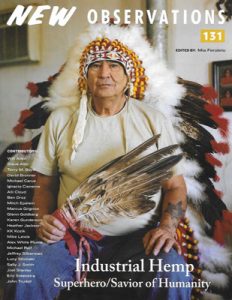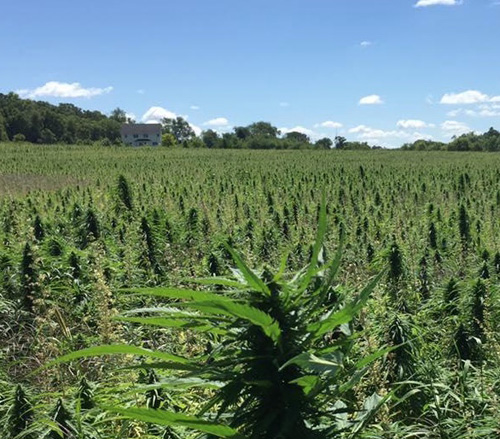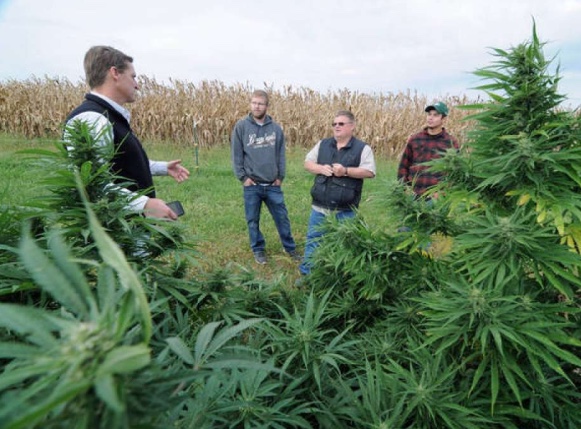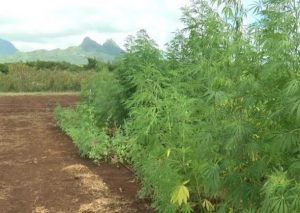 It’s hard to say the precise moment when CBD, the voguish cannabis derivative, went from being a fidget spinner alternative for stoners to a mainstream panacea.
It’s hard to say the precise moment when CBD, the voguish cannabis derivative, went from being a fidget spinner alternative for stoners to a mainstream panacea.
Maybe it was in January, when Mandy Moore, hours before the Golden Globes, told Coveteur that she was experimenting with CBD oil to relieve the pain from wearing high heels. “It could be a really exciting evening,” she said. “I could be floating this year.”
Maybe it was in July, when Willie Nelson introduced a line of CBD-infused coffee beans called Willie’s Remedy. “It’s two of my favorites, together in the perfect combination,” he said in a statement.
Or maybe it was earlier this month, when Dr. Sanjay Gupta gave a qualified endorsement of CBD on “The Dr. Oz Show.” “I think there is a legitimate medicine here,” he said. “We’re talking about something that could really help people.”
So the question now becomes: Is this the dawning of a new miracle elixir, or does all the hype mean we have already reached Peak CBD?
Either way, it would be hard to script a more of-the-moment salve for a nation on edge. With its proponents claiming that CBD treats ailments as diverse as inflammation, pain, acne, anxiety, insomnia, depression, post-traumatic stress and even cancer, it’s easy to wonder if this all natural, non-psychotropic and widely available cousin of marijuana represents a cure for the 21st century itself.
The ice caps are melting, the Dow teeters, and a divided country seems headed for divorce court. Is it any wonder, then, that everyone seems to be reaching for the tincture?
“Right now, CBD is the chemical equivalent to Bitcoin in 2016,” said Jason DeLand, a New York advertising executive and a board member of Dosist, a cannabis company in Santa Monica, Calif., that makes disposable vape pens with CBD. “It’s hot, everywhere and yet almost nobody understands it.”
Cannabis for Non-Stoners
With CBD popping up in nearly everything — bath bombs, ice cream, dog treats — it is hard to overstate the speed at which CBD has moved from the Burning Man margins to the cultural center.
A year ago, it was easy to be blissfully unaware of CBD. Now, to measure the hype, it’s as if everyone suddenly discovered yoga. Or penicillin. Or maybe oxygen.
Even so, you ask, what is CBD? Plenty of people still have no idea. CBD is short for cannabidiol, an abundant chemical in the cannabis plant. Unlike its more famous cannabinoid cousin, THC (tetrahydrocannabinol), CBD does not make you stoned.
Which is not to say that you feel utterly normal when you take it.
Users speak of a “body” high, as opposed to a mind-altering one. “Physically, it’s like taking a warm bath, melting the tension away,” said Gabe Kennedy, 27, a founder of Plant People, a start-up in New York that sells CBD capsules and oils. “It is balancing; a leveling, smoothing sensation in the body mostly, and an evenness of attention in the mind.”
Comparing it to the feeling after an intense meditation or yoga session, Mr. Kennedy added that the CBD glow has “synergistic downstream effects” in terms of social connections. “Around others, I find myself more present and attentive, more creative and open.”
Moreover, you are unlikely to find yourself microwaving frozen burritos at midnight after taking CBD, unlike with pot.
Such quasi-religious talk is common among CBD’s disciples.
“I’m a 30 y.o. male who has not experienced a single anxiety free day in my adult life,” wrote one user on a CBD forum on Reddit earlier this month. “About 3 weeks ago I started taking CBD-oil 10 percent and I can’t even describe how amazing I feel. For the first time in 15+ years I feel happy and look forward to living a long life.”
Such testimonials make CBD seem like a perfect cure for our times. Every cultural era, after all, has its defining psychological malady. This also means that every era has its signature drug.
The jittery postwar era, with its backyard bomb shelters and suburban fears about keeping up with the Joneses, gave rise to a boom in sedatives, as seen in the era’s pop songs (“Mother’s Little Helper,” by the Rolling Stones) and best sellers (“Valley of the Dolls,” by Jacqueline Susann).
The recessionary 1990s gave rise to Generation X angst, Kurt Cobain dirges and a cultural obsession with newfangled antidepressants (see Elizabeth Wurtzel’s “Prozac Nation: Young and Depressed in America”).
The defining sociological condition today, especially among millennials, is arguably anxiety: anxiety about our political dysfunction, anxiety about terrorism, anxiety about climate change, anxiety about student loan debt, even anxiety about artificial intelligence taking away all the good jobs.
The anxiety feels even more acute since the wired generation feels continuously bombarded by new reasons to freak out, thanks to their smart devices.
“You are inundated with terrible news, and you have no choice to opt in or out,” said Verena von Pfetten, 35, the former digital director for Lucky magazine who is a founder of Gossamer, a high-style magazine targeted to cannabis-loving tastemakers. “You open your computer, check your phone, there are news alerts.”
What a convenient time for Mother Nature to bestow a perma-chillax cure that seems to tie together so many cultural threads at once: our obsession with self-care and wellness, the mainstreaming of alternative therapies and the relentless march of legalized marijuana.
“That seems like a gift in these times,” Ms. von Pfetten said.
‘The New Avocado Toast’
The tsunami of CBD-infused products has hit so suddenly, and with such force, that marketers have strained to find a fitting analogy. Chris Burggraeve, a former Coca-Cola and Ab InBev executive, called it the “new avocado toast,” in an interview with Business Insider.
Then again, avocado toast seems so five years ago.
Fad chasers looking for the next-next big thing may want to check out the CBD-infused ricotta-and-honey toast at Chillhouse, the Instagram-ready coffee shop, nail salon and massage studio on the Lower East Side of Manhattan. And then retreat to Inscape NYC, a meditation and relaxation studio in Chelsea, to unwind with a stress-busting CBD Saturday session.
It would be false to suggest CBD is nothing more than an obsession for reiki-adjacent bicoastal millennials. According to the AARP website, CBD has become a popular treatment for pain and arthritis among baby boomers, some of whom may have been out of the cannabis game since they rolled their last doobie at a Foghat concert in 1975.
Such sumptuously packaged, premium-priced CBD products appeal to trend-conscious consumers in part because they promise a degree of indulgence — without the indulgence.
Despite its cannabis origins, CBD is not marketed as a recreational drug, but almost as its opposite: as a corrective to the ill effects of alcohol and even marijuana itself, which makes it catnip for hard-charging professionals who need to be fresh for a 7 a.m. breakfast meeting.
A detox drink under development called Sober Up, for example, will contain CBD and is supposed to support liver health and help prevent hangovers.
Fewer hangovers is also the sales pitch at Adriaen Block, a bar in the Astoria neighborhood of Queens that whips up CBD-infused negronis and old-fashioned cocktails. “You can maintain a conversation and know what you are saying,” said Zsolt Csonka, who owns the bar and mixes drinks there. “After two or three drinks, you’ll be able to go to the gym the next day.
When added to dishes like sesame shrimp toast at PopCultivate, a series of cannabis-centric pop-up dinners in Los Angeles, CBD (which is flavorless) can function as a social lubricant, just like a wine pairing, but without, according to proponents, the hangover.
“You become more engaged with your neighbors, talk more freely, and meet more people you dine with,” said Chris Yang, the molecular biologist turned chef behind the series.
But nowhere does the fervor for CBD seem greater than in health and beauty, where cannabidiol is often packaged with buzzy terms like “single origin,” “small batch” and “plant based.”
Among beauty products alone, CBD has already achieved cliché status, popping up in blemish creams, sleeping masks, shampoos, hair conditioners, eye serums, anti-acne lotions, mascaras, massage oils, soaps, lip balms, bath bombs, anti-wrinkle serums, muscle rubs and a Sephora aisle’s worth of moisturizers, face lotions and body creams. Even the bedroom is not safe from the CBD invasion, to judge by the spate of CBD sexual lubricants on shelves.
“I replaced my entire beauty routine with only CBD products,” read a recent headline in Glamour magazine.
This earthy, artisanal aura plays well with devotees of, say, Goop, who are already conditioned, after years of aromatherapy, cryotherapy and homeopathy, to accept a natural wellness mantra over anything on offer by Big Pharma and the medical industrial complex.
As an alternative health regimen, CBD holds particular appeal to women, said Gretchen Lidicker, the health editor of Mindbodygreen, a wellness website based in New York, and the author of “CBD Oil Everyday Secrets.” Noting the preponderance of female-run CBD businesses, Ms. Lidicker, 26, said that it is “no surprise that women are leading the CBD movement.”
“Women have long felt ignored and dehumanized by the medical and health care industries,” she said. “They experience longer wait times for treatment. Their pain and suffering are more likely to be dismissed as anxiety or hysteria. And the male body has typically been the model for medical research.”
Such concerns seem to have helped fuel the CBD movement. In an era marked by a loss of faith traditional institutions (governments, banks, hospitals), CBD has flourished, perhaps because it seems new, mysterious and untainted by the mainstream.
It may or may not be a coincidence that one of the best-known CBD retailers in New York, the Alchemist’s Kitchen in the East Village, serves up cannabidiol tinctures and gel caps, alongside workshops on astrocartography, lucid dreaming and full-moon ancestral healing.
And devotees swear it works. “It really helps with pain, inflammation and the general anxiety that grips me 24 hour a day,” said Anna Duckworth, 34, the editor of Miss Grass, a website based in Venice, Calif., that W magazine called the “Goop of cannabis.”
“There are millions and millions of people who are just fed up and don’t want to take these drugs that make them feel bad,” she said, “and want to go a more nontoxic, natural route.”
Snake Oil or Wonder Drug?
There’s one problem with that approach. When people turn to CBD-infused coconut lattes to cure acne and erectile dysfunction, it is not easy to separate hype from science.
Skeptics who assume CBD is just 21st-century snake oil, however, may be surprised to learn that the substance is being studied as a potential treatment for maladies as diverse as schizophrenia, insomnia and cancer.
“CBD is the most promising drug that has come out for neuropsychiatric diseases in the last 50 years,” said Dr. Esther Blessing, an assistant professor at New York University School of Medicine, who is coordinating a study of CBD as a treatment for post-traumatic stress disorder and alcohol use disorder. “The reason it is so promising is that it has a unique combination of safety and effectiveness across of very broad range of conditions.”
The National Institutes of Health database lists about 150 of studies involving CBD as a treatment for conditions as varied as infantile spasms and Parkinson’s disease.
And the research has led to medical treatments. In June, the Food and Drug Administration approved a cannabidiol-based drug called Epidiolex as a treatment for severe forms of epilepsy, representing the first government-sanctioned medical use for CBD.
Preliminary research also indicates that CBD may be effective as an antipsychotic in reducing the symptoms of schizophrenia, with fewer side effects compared with current antipsychotic drugs, Dr. Blessing said.
CBD has also shown promise to reduce cravings among people addicted to opioids, according to a study published in Neurotherapeutics in 2015. It may fight cancer, too. The authors of a review published in the British Journal of Clinical Pharmacology in 2012 wrote: “evidence is emerging to suggest that CBD is a potent inhibitor of both cancer growth and spread.”
That’s not to say that a CBD-laced gummy or two should be considered medicine.
“Most of the products where people are putting CBD in coffee or food, there’s no solid evidence that they contain enough CBD to do anything,” Dr. Blessing said. “A CBD coffee may only have five milligrams in it. In order to treat anxiety, we know you need around 300 milligrams.”
Don’t go chugging a shot of CBD oil just yet, though. Dr. Blessing said that much of the research is in its infancy, and the purity and dosage of some CBD consumer products may not reliable. And, she noted, CBD can have negative interactions with many medications, so potential users should talk to their doctors before taking it.”
There are legal hazards as well. As with all cannabis products, the federal government categorizes CBD products other than Epidiolex as a Schedule 1 drug, like heroin, according to the Drug Enforcement Administration. And cannabis remains illegal under federal law, even in states that have legalized marijuana for medical or recreational use.
Even so, the D.E.A.’s mission is to go after large-scale drug traffickers, not individual users, said Barbara Carreno, an agency spokeswoman. “We’re not swatting joints out of hands in Hilo, Hawaii, and we’re not going to focus on somebody who is buying lotion or ice cream that has CBD in it.”
Although there have been scattered raids of CBD retailers around the country, several states, including Alabama, Texas, Florida and Oklahoma, have passed laws approving specific CBD products to treat specific ailments. And CBD shops have cropped up nationwide, in Los Angeles, Oklahoma City and Austin, Tex., to name just a few cities.
In New York City, for example, CBD tinctures and other products can be bought at specialty shops, health food stores, yoga studios, flea markets, boutiques and even some corner delis. (The availability of CBD is perhaps not surprising, given Mayor Bill de Blasio’s continued efforts to reduce the penalties for low-level marijuana violations.)
Aside from a federal crackdown, the only thing that may eventually kill CBD’s momentum is hype itself, said Mr. DeLand of Dosist.
The frothy claims about CBD “sets up some false expectations that the molecule will never be able to live up to,” Mr. DeLand said. Not only are questionable claims an invitation for government regulation, but they risk making even legitimate applications seem dubious, he said.
“In isolation, CBD obviously does have some benefits, but it’s certainly not a catchall for all the world’s health problems,” he said. “We are at the tip of the iceberg on what its therapeutic applications are, and how to make those applications repeatable.”
“The future of this industry,” Mr. DeLand added, “is going to be based on fact, not fiction.”
This content is from the New York Times.
 The New York Times asked a provocative question in the latest issue of their Sunday Magazine: Why is CBD everywhere?
The New York Times asked a provocative question in the latest issue of their Sunday Magazine: Why is CBD everywhere? New Observations Magazine is an independent, non-profit contemporary arts journal that is written edited and published by the arts community. Our good friend Mia Feroleto recently published issue #131 which focused on industrial hemp and features a number of articles by and about the hemp industry.
New Observations Magazine is an independent, non-profit contemporary arts journal that is written edited and published by the arts community. Our good friend Mia Feroleto recently published issue #131 which focused on industrial hemp and features a number of articles by and about the hemp industry. As of 2017, 15 other states enacted their own hemp industries, which all told brings in a half-billion dollars annually, according to Gusciora.
As of 2017, 15 other states enacted their own hemp industries, which all told brings in a half-billion dollars annually, according to Gusciora. Gov. Bruce Rauner signed the Illinois Industrial Hemp Act on Aug. 25, adding Illinois to an increasing number of states that allow the cultivation of the non-hallucinogenic form of cannabis for use in a myriad of products from oils to fibers. The bill had passed the Illinois House of Representatives on a 106-3 vote and passed unanimously in the Senate.
Gov. Bruce Rauner signed the Illinois Industrial Hemp Act on Aug. 25, adding Illinois to an increasing number of states that allow the cultivation of the non-hallucinogenic form of cannabis for use in a myriad of products from oils to fibers. The bill had passed the Illinois House of Representatives on a 106-3 vote and passed unanimously in the Senate. The grower licenses, issued to farmers on Kauai and the Big Island, will be valid for two years — or as long as license holders comply with the rules of the program.
The grower licenses, issued to farmers on Kauai and the Big Island, will be valid for two years — or as long as license holders comply with the rules of the program.

 We are celebrating the passage of SB 1409 in California, which fully legalizes hemp farming in the state. A major victory for the hemp industry, Governor Brown signed the Vote Hemp sponsored legislation Sunday, September 30, 2018, and the law will go into effect January 1, 2019, finally allowing California farmers to enter the rapidly growing hemp industry on a wide scale.
We are celebrating the passage of SB 1409 in California, which fully legalizes hemp farming in the state. A major victory for the hemp industry, Governor Brown signed the Vote Hemp sponsored legislation Sunday, September 30, 2018, and the law will go into effect January 1, 2019, finally allowing California farmers to enter the rapidly growing hemp industry on a wide scale.